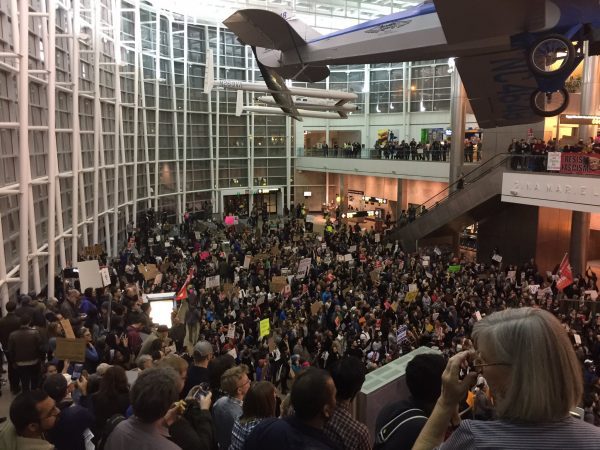Thousands of protesters were pouring into American airports Saturday in response to Donald Trump's refugee ban, when suddenly light rail service skipped the Seattle-Tacoma airport. A similar scene unfolded in New York, where Port Authority police briefly barred people from getting to the protests at JFK via transit until Governor Cuomo intervened.
Zach Shaner at Seattle Transit Blog has this report on the SeaTac transit situation, where police also intervened. The incident raises serious questions about who controls access to transit in these situations, he writes:
Around 6:30pm, Link light rail operators were asked by the Port of Seattle Police Department to suspend service to SeaTac/Airport Station. Operators complied, and protesters and passengers were forced off at Tukwila Int’l Blvd station and forced either to catch crush loaded A-Line buses or walk the 1.5 miles to the terminal. The station is on Port property, and Port Police asked for the closure in order to buy time to get backup police to the airport, The Stranger reports. Within minutes, Sound Transit began taking a beating on Twitter, as by all appearances it had been they who ordered the closure.
But Sound Transit executives later indicated they were surprised by the closure, as it had already been implemented by lower-level staff. Once CEO Rogoff was made aware of the closure, he immediately worked to get service restored, and trains resumed service to SeaTac shortly after 7:00. Dow published a series of tweets thanking CEO Rogoff for restoring service, while also saying that Metro (who operates Link) and Sound Transit would meet beginning Monday to establish closure procedures that ensure that such an action won’t be taken again without being elevated to senior staff.
So while the closure was unfortunate and obstructed the rights of legal public demonstration, I think it’s appropriate to react gracefully in light of the multi-agency response. Saturday was a rightfully tense day at a multi-jurisdictional facility (CBP, FAA, DHS, Port, ST, KCM) concerning tragic matters of life, death, family, and national identity. The Port was supportive of the protest cause, and earlier in the day had released a statement condemning the executive orders. Port Commissioner Gregoire also repeatedly voiced support.
In light of the closure, riders deserve an answer to the question, “Who can order closures, and when?” But for its part Saturday, Sound Transit had successfully elevated the issue to the Executive level, taken reparative action, and issued a public statement, within 30 minutes. All things considered, that’s pretty damn good. It’s good to know that our agencies support the rights of protest, and understand the value of transit as a public utility that makes it possible.
More recommended reading today: Bike Portland reports on local bicyclists who've taken street sweeping into their own hands during the hazardous winter months. The Natural Resources Defense Council releases its vision for what a responsible $1 trillion infrastructure plan would look like. And World Streets reports from Bogota's recent Car Free Day, which yielded some remarkable temporary public health improvements.





